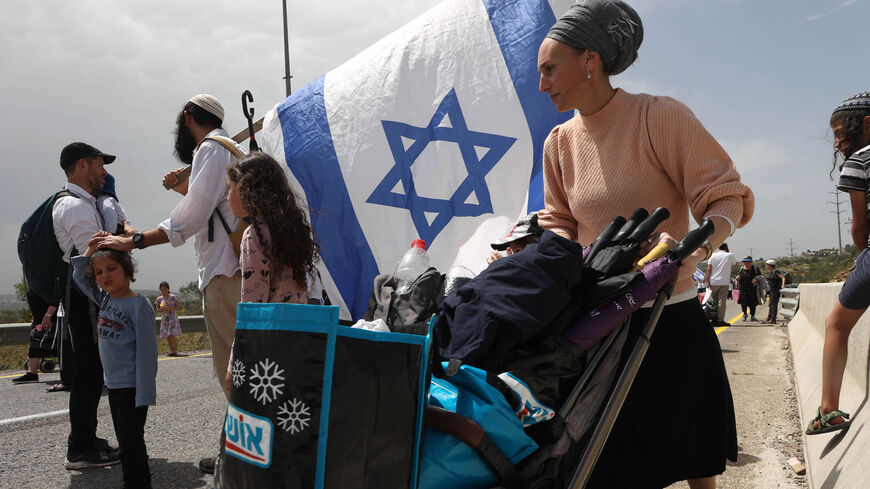TEL AVIV — Israeli security chiefs are increasingly concerned over the uptick in Jewish attacks and violence against West Bank Palestinians being ignored and even tacitly accepted by Israel’s political leadership.
The phenomenon has expanded to the point that leading progressive Jewish groups in the United States issued on Monday a joint statement, expressing “growing anguish and horror” over the recent wave of violent attacks by Israeli settlers against Palestinians, and urging Prime Minister Benjamin Netanyahu to stop “excusing” and “protecting” the perpetrators.
In fact, heads of Israel’s three leading defense and law enforcement agencies — the Israel Defense Forces (IDF), the Shin Bet and the police — had issued an unprecedented public stand to that effect some two weeks ago, designating these attacks on Palestinian villages as "nationalist terrorism" that merits stepped-up countermeasures.
"The reason they came out publicly against this phenomenon is simple," a senior Israeli security source told Al-Monitor on condition of anonymity, referring to the joint statement by Israel’s top soldier Lt. Gen. Herzi Halevi, Shin Bet head Ronen Bar and Police Commissioner Kobi Shabtai. “The political echelon is paralyzed. The moderates, including [Prime Minister Benjamin] Netanyahu, are afraid of the extremist settlers and their henchmen in the government. … Herzi Halevi, Ronen Bar and Yaakov Shabtai are the only ones left to stand in the breach."
The increased attacks on Palestinians and their property have prompted increasing criticism from outside of Israel of the government’s lax response. "More and more colleagues are asking them tough questions," a source close to Israel's security leadership told Al-Monitor. "Foreign leaders, heads of security services from Europe, the United States and elsewhere, journalists — they all find it hard to believe that the powerful and all-powerful Israeli security establishment cannot cope with a few dozen Jewish rioters."
"The entire world is watching these scenes, which began on the night of the great fires in [the Palestinian village of] Huwara [in February] and continued in many other similar cases, and cannot answer the question of where is the IDF, where is the Shin Bet, where is the police. Where are all these bodies, which successfully fight Palestinian and Arab terrorism of various types and scopes and teach the whole world how to do it, when it comes to Jewish-made terrorism?" the source said.
This question also reverberates behind the closed doors of Israel's security agencies as it becomes increasingly clear that one of the most skilled countries in the world in fighting terrorism does not have the tools to deal with home-grown attackers.
"Soldiers cannot deal with this," a senior Israeli security source told Al-Monitor on condition of anonymity. "These are young people ages 18-20 — they do not have police training, they do not have precise instructions, they know exactly what to do when they encounter an Arab terrorist, but they cannot deal with terror from their side.”
The soldiers, weighed down by heavy bulletproof vests, weapons and helmets cannot outrun the fleet-footed young masked settlers familiar with the area’s rocky terrain, he noted.
Not only are the troops ineffective, the source said, the police are scarcely present on the ground and lack motivation. The Shin Bet security agency does its best, providing precise intelligence information and issuing warnings of impending Palestinian attacks against Israelis, but is not authorized to make arrests and to physically stop the Jewish rioters.
Based on Shin Bet's recommendation, several particularly violent settlers have been detained without trial (administrative detention). This controversial weapon is almost always reserved for Palestinian suspects and its use against Jewish settlers has generated fury among the hard-line members of Netanyahu’s government who represent the settler constituency.
As they grapple with the response to Jewish attacks, Israeli security forces are also responding to intelligence assessments regarding Iran’s growing influence on Hamas and other militant Islamist groups gaining ground in the West Bank.
"Hamas is now deep within Iranian influence and is intimately connected to Iranian money, which floods the territory with weapons that come from Jordan,” a senior Israeli intelligence source told Al-Monitor on condition of anonymity. The accelerating disintegration of the Palestinian Authority [PA] and its security forces has paved the way for the rise in Hamas power and influence. “The PA is on the verge of real collapse this time,” the source said. “This time we are not just crying 'wolf.'"
This state of affairs will force Netanyahu to make some fateful decisions soon, while impeded by a coalition that is highly unlikely to approve them.
"Netanyahu understands the situation, he has a lot of experience and he knows that the collapse of the PA would be a colossal disaster by any standard," the senior Israeli intelligence source told Al-Monitor. "He also knows the extent to which the Jewish terrorists inflame the atmosphere in the West Bank, he will have to decide whether he lets the PA collapse or saves it, and whether he gives the right instructions to the defense establishment to solve the problem of Jewish terror. If he were leading an ordinary government, this would not have to be a problem, but he heads a government with extremists who see the collapse of the PA as an ideological imperative."
Finance Minister Bezalel Smotrich, who heads the Religious Zionism party and has also been granted authority to approve settlement construction, is Netanyahu’s toughest obstacle in this regard. He has control over PA funds frozen by Israel in response to the PA’s support for militants and their families and will have a key role in deciding whether to save the PA, or let it collapse.
"Smotrich is a wise person, he sees intelligence material, and he knows that if the PA falls and Hamas takes over the territory, rivers of blood will flow through the West Bank. Much of that blood will be the blood of Smotrich's supporters — the settlers. He is in a difficult position," said the senior intelligence source.
Israel’s challenge in dealing with the complexities of developments in the West Bank is further compounded by international condemnation of Netanyahu's extremist government. Its shaky international standing was one of the reasons that the military operation against militant strongholds in Jenin this week lasted just two days.
Israel is now trying to explain to the world the changes it has instituted in the approval of new construction in the settlements, which has been significantly shortened in order to facilitate accelerated planning and building, as well as the transfer of authority over civilian life in the West Bank from Defense Minister Yoav Gallant to Smotrich. Israel's explanations are not always convincing, to put it mildly. If, indeed, the assessments are correct and an all-out conflagration breaks out soon, Israel’s hands will be tied as never before.








